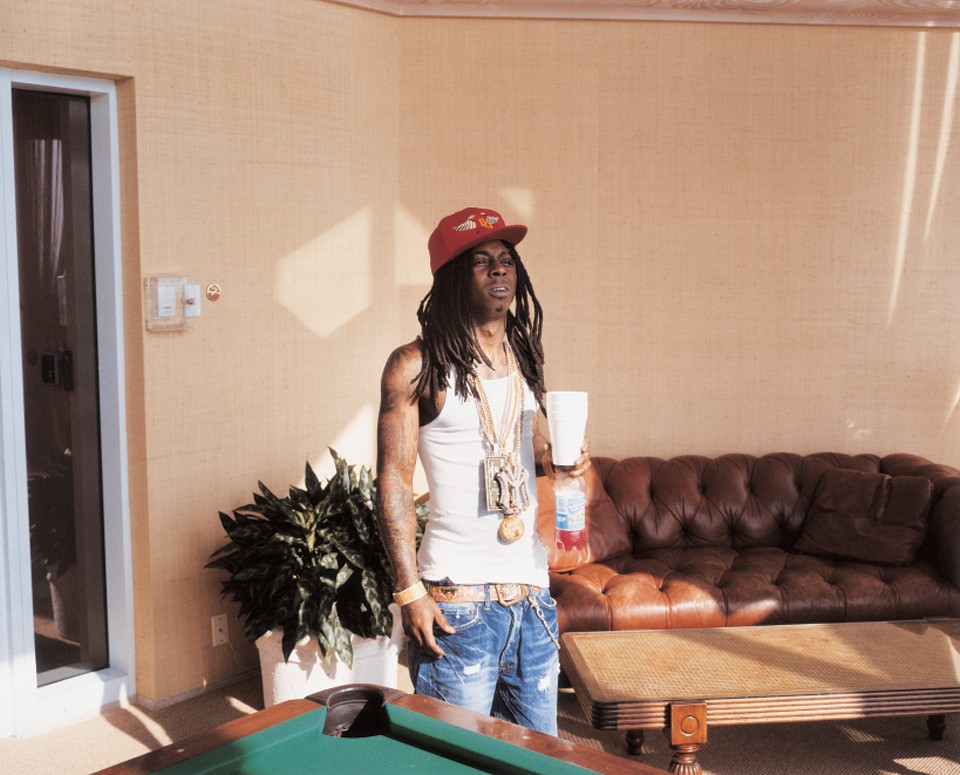 Jason Nocito for The FADER
Jason Nocito for The FADER
In 2005, on his album Tha Carter II, Lil Wayne — then just 23, still more precocious than acclaimed — called himself the best rapper alive. The music industry (ever easily flummoxed) was quite flummoxed. The very next year, he proved himself right. It was May 22, 2006, to be exact, in the midst of what is now an all-time classic run of mixtape logorrhea. That’s when Wayne gave us Dedication 2.
To mark its ten-year anniversary, I myself went back to revisit the place where I first found that wonderful thing: Status Ain’t Hood, the great Village Voice blog from now-Stereogum writer Tom Breihan.
Here’s Breihan, in 2006:
[Lil Wayne’s] just a monster here, tossing around liquid non-sequiturs ... and diamond-hard snarls … like it's the easiest thing in the world. He's on such a ridiculous roll these days that he can just sit back on the beat and keep batting around ridiculous boasts like a cat with a ball of yarn and he'll still consistently be the best rapper working … It's amazing how this guy just keeps getting better. Right now, he has no ceiling.
And here’s another thing Breihan wrote at the time, a little disclaimer: “I'm not generally predisposed to raving about mixtapes.”
The term “mixtape” is as prevalent now as it was in 2006, but its meaning has evolved so much from then: perception-wise, there is increasingly little distinction between a mixtape and a “proper” album. Even to try to distinguish a mixtape from an album by calling the former a “free” release seems odd. If You’re Reading This It’s Too Late, Drake’s 2015 epic, was for sale on iTunes but Drake insisted on referring to it as a tape. And what the hell is the “correct” term for Chance’s recent breakthrough Coloring Book, the first streaming-only release to make the Billboard 200 album chart? No one really knows, or really cares.
Back in the days of Dedication 2, the term mixtape meant something more specific. It was a self-released product, conceptualized and funded by the artist or their DJ without record label involvement. Shipped out nearly as soon as it was done, it was for sale in a slim jewel case or, if you could find it, available as a free download online. It was very often made up of beats jacked from other artists. Using preexisting beats meant you didn’t need a production budget, but it was much more than a cost-cutting measure: the point was to take someone else’s beats, rap better than them, and “own” the beats yourself.
There was no bad blood over the practice of lifting beats because everyone did it; back then, a lovely socialistic attitude prevailed. All in all, it meant mixtapes were almost, by definition, flawed: they were alternate releases from great or hot artists, rawer but not necessarily worse than albums, thrown together in a fit of raw productivity.
Dedication 2 changed all that. To start with: it wasn’t at all tossed off, but rather carefully assembled by DJ Drama, then the reigning king of the mixtape circuit. His Gangsta Grillz series, thanks to beloved tapes like Young Jeezy’s Trap or Die, was the most trusted brand name in the game. And Drama’s voice, sandwiched between the tracks, had its own appeal. For many of us, hearing his ad-libs again these days — “DJ the fuck Drama!”; “Barack O’Drama!” — brings little buzzes of sentimental joy.

More importantly: Dedication 2 was an expression of Wayne at the height of his formidable powers. It didn’t matter if tracks cut off after barely a verse, or if the tape pinged between bizarre spoken-word interludes and circular snatches of music, or if we’d heard the beats before. Definitely not the last one — Wayne was funnier, and sadder, and meaner, and madder than anyone who'd graced the tracks before him.
All that is what made Dedication 2 great: it felt like being inside of Lil Wayne’s martian brain. In that, it was a highwater mark of the form.
The ironic thing about all that: according to Drama himself, the success of Dedication 2 doomed the mixtape as we then knew it.
“The lines were becoming skewed around those times,” Drama told The FADER this week. “Unbeknownst outlets, they started bootlegging mixtapes. They were taking it to the next level: they were selling the shit in stores, putting barcodes on them. The shit got crazy.”
Mixtapes were always for sale. The difference, suddenly, was that they went from the black or gray market — shoe stores, mixtape huts, sidewalk vendors with their wares spread out on ratty blankets — to licensed brick-and-mortar music shops. “It was street culture originally,” Dama said. “But because of projects like Dedication 2, they were in demand. People were going beyond mixtapes that stemmed from Canal Street in New York or the flea markets in Atlanta. Consumers were going to the regular music outlets and saying, ‘Where’s Lil Wayne’s Dedication 2?’”
And with that heretofore unseen demand came unwanted attention. Nearly exactly nine months after Dedication 2 dropped, Drama’s Atlanta’s studio — 147 Walker Street, where he recorded much of the Gangsta Grillz series, including Dedication 2 — was raided. Working in coordination with the RIAA, officers from the Morrow, Georgia, police department confiscated just about everything that was on the premises: recording gear, vehicles, 81,000 CDs. They also arrested Drama and his business partner Don Cannon, charged them each with a felony violation of Georgia’s RICO law, and held them on $100,000 bond.
“I saw cops jump out, M16s drawn, and they put me directly on the ground,” Drama recalled in 2008. “They were screaming and yelling, causing a ruckus … They brought the dogs in there, basically asking, ’Where are the guns and drugs?’ You tell them a bunch of times, ’Nah.’
“January 17, ‘07,” Drama says now. “That was a real pivotal moment.”
As The New York Times explained at the time, “The [RIAA] makes no distinction between counterfeit CDs and unlicensed compilations like those that DJ Drama is known for.” Meaning: the RIAA didn’t care that artists were working directly with Drama. Gangsta Grillz releases contained unlicensed material, meaning both the jacked beats and the artist’s own original verses, which were technically proprietary to the record labels with which they were then under contract. They were considered, as a whole, illegal.
RICO is short for the Racketeer Influenced and Corrupt Organizations Act; it was created in 1970 to combat the mafia, and gives law enforcement right to seize all your assets. Eventually, Drama’s lawyers negotiated the charges down from a felony to a misdemeanor. What he was actually convicted with was a violation of Georgia’s “true names and addresses” law. (It was a technicality of a law, promoted by the RIAA in many states, to define and fight bootlegging: to be considered legal for sale, a CD had to have an address on it.) Drama was fined $250,000. But he’d already had a bank account seized during the initial investigation, and that bank account was never returned to him. And that account, he said, had “waaaay more than $250,000 in it.”
After the raid, Drama and Cannon were advised to find separate legal representation. Over the course of the proceedings, things got messy; for a couple of years, the best friends and business partners fell out altogether. At one point, as part of their agreement with the RIAA, they were forced to record an anti-bootlegging PSA for the RIAA. Awkwardly, without really speaking to one another, Drama and Cannon made themselves look in the camera and plead with faceless bootleggers to respect the rights of artists everywhere — the same kind of artists that they’d helped make iconic with Gangsta Grillz. The PSA was never released.
The RIAA had taken a big swing, and it had the desired effect. The sight of Drama and Cannon, in cuffs and county prison jumpsuits, sent a chill through the mixtape circuit.
Suddenly, DJs weren’t willing to play as fast and loose with the rules. That was the point where the mid-2000s mixtape model let out its death rattle. And Drama traces it all back to Dedication 2.
From there, the term “mixtape” evolved. The mixtape business moved online, as sites like DatPiff, launched in 2005, became the central providers. Rappers started using more and more original or licensed beats on their tapes. Then Drake’s So Far Gone, from 2009, became a new kind of ideal: it showed a formidable career could be defined on the strength of a singular mixtape. Unified production, stripped of DJ drops or shout-outs, clean: it was the blog-rap generation’s Trap or Die.
There always were, and always will be, exceptions. Gucci Mane’s stretch of mixtapes in the late-2000s rivals Wayne’s famous mid-2000s run, and Gucci was already well established at that point. 50 Cent and Dipset had used in-house production on mixtapes way before any Drakes or RIAA raids went down. But there was a sea change: the gulf between what we understand an ‘06 mixtape to be and what we understand a ‘16 mixtape to be is grand.
For some of us, mixtapes — free of any label meddling — were always the purest expression of an artist’s vision. After So Far Gone, they could be not just that pure expression but slick and grandly executed as well. They were no longer ephemera.
And Dedication 2 opened the door for that change. Its greatness and popularity made it so that fans far, far from Canal Street or the Atlanta flea markets knew about, and craved mixtapes, too. They were covered in major newspapers and all over the internet. Now the whole world wanted in — big businesses included. And maybe that was the final straw for the boundary-less mixtape: when dealing with Spotify or Apple, acts must clear all samples and own all rights.
Recalling the recording process of Dedication 2, Drama is effusive of Wayne, and generous with the anecdotes (for one: Wayne’s legendary “sports, sports, sports” rant on "SportsCenter" was spurred off a script that Drama had written for the tape). But when speaking of the ensuing popularity of this thing he made, Drama says, “I look it as a negative. It hampered the legality; it brought about the downfall of mixtapes. They were, like, so in demand. They became too big, too powerful, too large.
“That tape,” he says, with equal amounts awe and chagrin, “was larger than life.”
